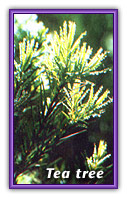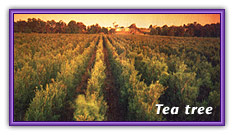 Source
Source
Tea tree is a small tree in the myrtle family that grows in wet ground on the northern coast of New South Wales and southern Queensland, Australia. The essential oil is produced commercially on plantations in New South Wales.
Traditional Use
Interest in tea tree oil emerged in the 1920s when Australian researchers found it had up to thirteen times greater antiseptic activity than carbolic acid, then a well-known germicide. In 1930, The Medicinal Journal of Australia revealed that the oil, when applied to carbuncles and pusfilled infections, dissolved pus and inhibited bacterial growth without damaging surrounding tissues. Further studies established the oil as a disinfectant in soaps, a topical treatment for parasitic skin diseases, and a deodorant for wounds. A couple of drops in a glass of water were recommended as a gargle for sore throat at early stages of inflammation. Its confirmed antiseptic activity, gentleness to oral mucosa, and apparent lack of toxicity endeared it to Australian dentists. Physicians used the oil to treat throat infections, dirty wounds, candida, and fungal infections including ring worm and athlete's foot.
 Current Status
Current Status
Tea tree oil is now one of Australia's more popular herbal exports. A 1990 clinical trial involving 124 patients provides evidence of its effectiveness in the treatment of facial acne. A 5 percent solution of tea tree oil in a water-based gel was less effective (because of slower onset of action) than 5 percent benzoyl peroxide in a water-based lotion, but was better tolerated by facial skin with less scaling, dryness, itching, and irritation than with the benzoyl peroxide preparation.
A recent multicenter, randomized, double-blind clinical study of 117 patients found that 100 percent tea tree oil applied topically to fungus-infected toenails was as effective as a standard treatment of I percent clotrimazole solution. Another recent study found that tea tree oil had strong activity against antibiotic-resistant bacteria strains.
Preparations
The essential oil is generally available, as are vaginal suppositories for candida. In the mid-1980s, an Australian quality standard for tea tree oil was established, calling for a component known as terpinen-4-ol to constitute 30 percent or more of the oil, with less than 15 percent cineole, a compound considered to reduce the oil's quality. The standard has some latitude, with higher quality oils containing 40-47 percent terpinen-4-ol, and only 2.5 percent cineole. Oils high in terpinen-4-ol and low in cineole are considered best for predictable results.
Cautions
None noted, though as with all essential oils, some individuals may experience contact dermatitis. Internally, all essential oils are potentially toxic. Use only as directed.
Symptoms
Acne
Candida
Actions
Antibacterial
Antifungal

![]()
![]()
![]()
 Source
Source Current Status
Current Status